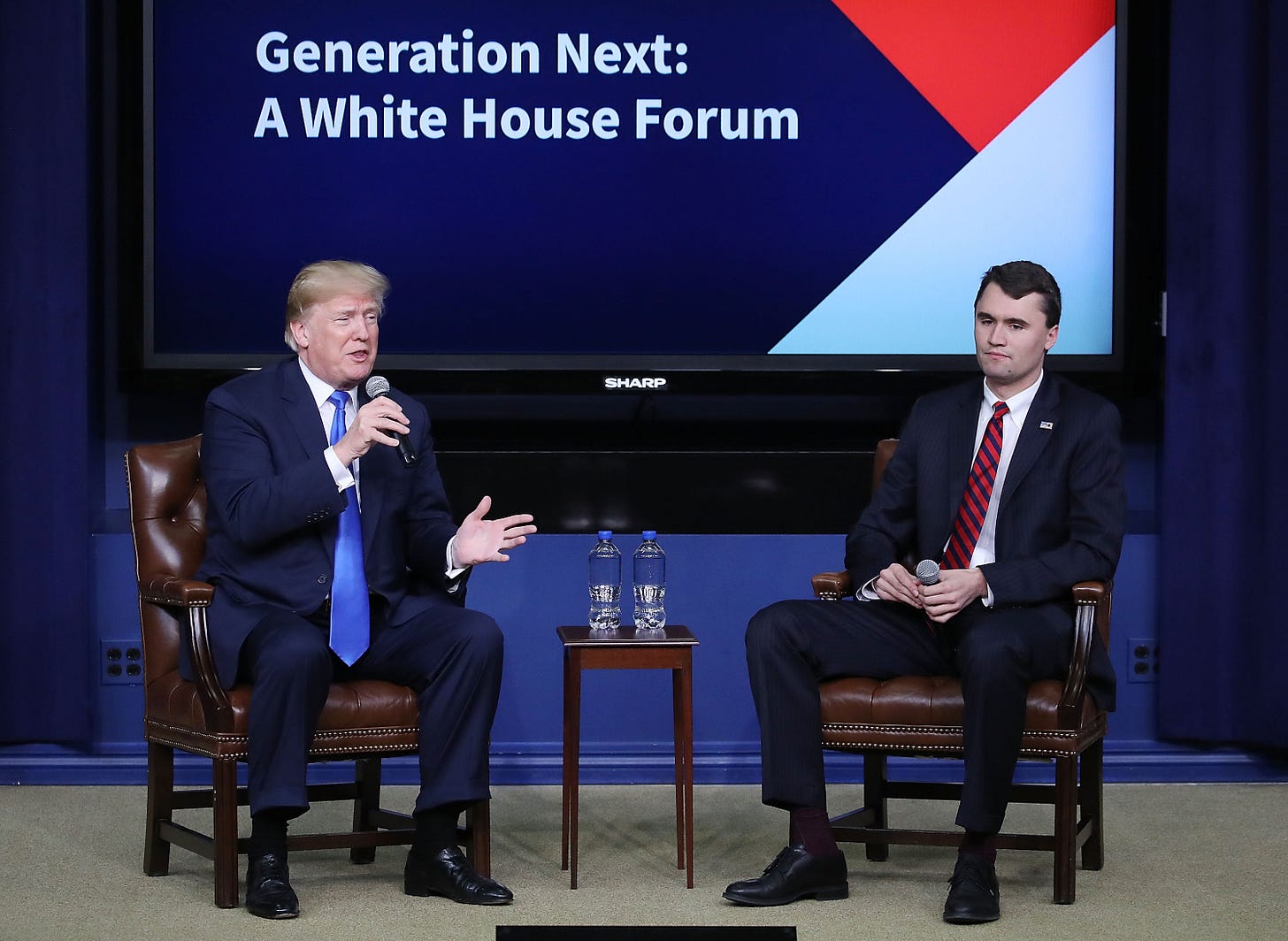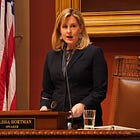The Charlie Kirk Shooting Is Just Another Sign of America's New Violent Era
Like terror-plagued Italy in the 1960s and 1970s, the US under Trump is entering its own 'Years of Lead.'
This piece was first published by writer Jack Crosbie on Discourse Blog Substack. Zeteo is republishing it with its permission and a new headline.

Yesterday, conservative activist and provocateur Charlie Kirk was shot and killed during a rally at Utah Valley University. There are pictures and videos and rampant speculation all over the internet. You will not find them here. The shooter’s name and motivation are still unknown as of this writing. In the next few hours and days, we will likely have definitive answers to these questions, but we do not have them now.
What does seem clear is that the American ‘Years of Lead’ are here.
The term refers to a period of Italian history roughly between 1960 and 1980 that was defined by widespread political violence and domestic terrorism, perpetrated by both right and left-wing groups. The scale of the violence in Italy — hundreds dead in massacres, bombings, and assassinations — makes applying the term to the United States seem hyperbolic at first. But consider: Italy had a deeply divided political system, a repressive government, and widespread economic woes. It was filled with motivated and organized radical political groups on both the left and the right. It was quite a bit like our country today.
And now we see the results. We are in a different era: the weapons are different, the tactics are different, the groups are different. The American Years of Lead will not look like Italy’s, but they are here all the same. In this country, any person can pick up a gun and find someone to shoot for ideological reasons. As we have seen time and time again, it is so very easy to do.
But access to firearms in this country is not new. You have been able to get a gun and shoot a lot of people for years. What’s different now is that, in the past half-decade, the contours of this violence have shifted. The motivations of mass shooters are still a difficult trend to map, but more and more people appear to be carrying out assassinations for very specific reasons, targeting very specific people. Put another way, Luigi Mangione was not an anomaly, and nor is the person who killed Charlie Kirk. In the next few years, I suspect they will become known simply as the start of a trend.
The structure of American society has deteriorated to the point where a growing number of people see violence as the only way they can change their world. In some ways, this has always been the case – as I’ve written before, basically all human governance comes down to the use of force at some point or another – but society is supposed to be structured to insulate everyday people from that truth.
The kind of violence that killed Kirk is supposed to be carried out by people who are so deranged, or crazy, or sick, or in pain, that they take an extreme action that is outside the bounds of what our society should permit. But look at where we’re at. Our society is increasing the number of people who are sick or in pain every day. It has broken down and squeezed so hard that ordinary people may feel deranged on a bad day. But most of all, for those who were already harboring thoughts of violence or hate – like so many on the far right – the chaos is an easy excuse. That the president looks fondly on their views or, at the very least, shows little interest in prosecuting them only adds to the opportunity. The country is full of loaded guns in shaky hands, swinging back and forth, from target to target.
What this looks like, on a practical level, might be a bit different than what most people think. There will not be another American “civil war.” The country is too geographically and economically and socially enmeshed for that. But the lone wolves, the fringe groups, and the homicidally desperate will strike, again and again, killing both the innocent and guilty alike.
A few months ago, a man drove a truck bomb into a fertility clinic in Palm Springs. The bomber was the only one who died, but the intent was there. His successors will not be as sloppy. The story didn’t get much traction when it happened, but it has stuck in my mind ever since. I do not believe we will get large armed groups fighting each other in the streets. What we will get is more incidents like the Palm Springs one – single shots ringing out in public spaces, or a brief hail of gunfire. Schools and churches will continue to come under attack. People will weaponize their vehicles – the second-deadliest machines in the country – and turn them into battering rams and bombs to slam into buildings and crowds. The state will denounce the attacks it deems to be perpetrated by its enemies and use them to justify expanding its use of force in the streets. Nonlethal rounds shot at protesters will, perhaps, become live ammunition.
There is nothing now that we can do to stop this: ending it will take years of reform and an ease to the material hardships of this country to make it abate.
If that sounds hopeless, I’m sorry. I don’t want people to live their lives in a state of constant fear. It is extremely unlikely that any one person will be affected by this trend, statistically speaking – though marginalized groups are far more at risk. But however insulated we may personally be from some of this violence, what people must do is understand and recognize that it exists. This won’t go away if we do not first recognize that our society is broken and seek to fix it. That means we can’t trust people who want us to “return to normalcy,” or who offer hollow promises of stability without changing the rotten foundations that our violent country rests upon. A more peaceful world is possible. It will take new leadership and new ideas. We do not have those yet. We may not get them anytime soon. Until then, we live in the years of lead.
Jack Crosbie is a writer who covers conflict, politics, labor, and the media for Discourse Blog. He was previously a contributing writer at Splinter and has written for Rolling Stone and The Atlantic.
Subscribe to Discourse Blog for more of Jack’s writing.
Check out more from Zeteo:






I find it very frustrating that we highlight one event like this and call it a new era of violence in a country with regular mass shootings, where police murder people of color with impunity, and state violence is carried out regularly. It's not a new era of violence at all. It's just that we don't classify all the violence happening as violence. There were more stories about Charlie Kirk in the last 24 hours in mainstream press than every story about the US financing a genocide in Palestine over the last year. The US invades and overthrows leaders. It causes mass disruption and chaos in regions that lead to more mass death. The US murdered a million Iraqi human beings and threw an entire region into chaos for the last 20 years, causing unknown amounts of related deaths. This is a country of violence. Why is it some new era of violence just because someone famous was assassinated? We've had presidents assassinated. The atrocities committed in Vietnam because the us wanted to protect colonial interests involved setting babies on fire. The school of the Americas trained south American guerilla fighters to kill children with machetes. You bring up the years of lead in Italy? That goes back to the gladio operation with the leave behind networks after WWII.
the crimes if this empire are too numerous to count and that violence always comes home. What's new about this?
James Baldwin, 1971: “What the world does to you, if the world does it to you long enough and effectively enough, you begin to do to yourself. You become a collaborator, an accomplice to your own murderers, because you believe the same things they do.”
“This is not America”- This has been America since 1776. If the legend holds true, it was Crispus Attucks, a Black man, who was the first to die for the revolution. And after it was over and the British were defeated, America was kind enough to let all the Blacks who were enslaved (Attucks was a free man) stay that way. Oh, but you don’t have to look way back into those “ancient” times. Charlie Kirk was a supporter of the insurrection of January 6th, 2021. “There are hundreds of peaceful people that went into the Capitol on January 6. They did not touch a police officer. They didn’t smash a window, but they have been charged federally for trespassing and called insurrectionists for the rest of their life.” Capitol police officers were assaulted, maimed and some died in the aftermath. But the phrase Charlie’s folks often use is “back the blue”, right?
“violence has no part in our political system”-straight capping! Out of our 46 presidents so far, four have been assassinated. John F. Kennedy, William McKinley, James Garfield and Abraham Lincoln, to be more precise. Ronald Reagan survived the assassination attempt by John Hinkley. Other presidents to also survive assassination attempts include Andrew Jackson, Theodore Roosevelt, Franklin Roosevelt, Harry Truman and Gerald Ford.
“This is not who we are”- Yes it is. Even when you look outside of presidents, any number of political figures have met their maker thanks to someone holding a gun. Civil rights activists like Martin Luther King, Malcolm X, and Fred Hampton. Senator Robert F Kennedy. Oh, and going way, way back, Secretary of Treasury Alexander Hamilton. (folks have seen the play, right?)
“Guns have no place in America”- knock it off. Donald Trump survived an assassination attempt last year and not a single Republican voted to support meaningful gun-reform legislation. Not a single one.
The killing of Charlie Kirk can rationally and morally be condemned. But the choice—and it is a choice—to simply look past the cosigning of violence he was responsible for is hypocritical. It’s more important to call these people out for what they were, regardless of the circumstances of their departure.
Charlie Kirk was a bigot.
Charlie Kirk was a misogynist.
Charlie Kirk was the real life version of the Christian Bale character in American Psycho.
Charlie Kirk’s American dream is not mine. It never has been. It never will be. I don’t aspire to the aesthetic of a Charlie Kirk. In his ideal world, someone who looks like me isn't supposed to be on equal footing with him.
Kirk’s legacy is one of unashamed racial vitriol—underneath which is an existential fear at the gradual “browning” of America, belligerence disguised as folksy talk, and, yes, policy murder. It is not completely unpredictable that he met his fate in a way that he decried was no big deal.
May he rest in peace, but damn—he could have at least cleaned up behind himself before he left.